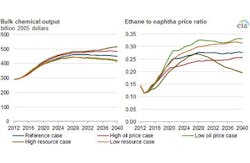Projected bulk chemicals production is quite sensitive to alternative assumptions regarding long-term oil prices and domestic oil and natural gas resources, according to a recent analysis by the U.S. Energy Information Administration (EIA).
This sensitivity reflects price changes for natural gas and hydrocarbon gas liquids (HGL), which bulk chemical producers use for heat, power and feedstock. Also, changes in oil prices affect the bulk chemical industry because the industry's international competitiveness relies on the price ratio of oil-based feedstock (mostly naphtha) to natural gas-based feedstock (mostly ethane), EIA's Annual Energy Outlook 2014 (AEO2014) Issues in Focus states.
Trade and consumer spending are economic expenditure categories most important to the bulk chemical industry, according to the Commerce Department's Bureau of Economic Analysis. Energy prices affect all economic expenditure categories, which in turn affect the entire industrial sector, including industries such as glass and paper manufacturing. Changes in economic expenditures affect total output and energy consumption. However, the bulk chemicals industry is one of the most sensitive, as shown in alternative scenarios analyzed for the AEO2014. Changes in the food and paper industries drive changes in renewable fuel consumption, whereas consumption of other fuels is more strongly linked to chemical output changes.
Bulk chemicals are affected by natural gas prices specifically because it is a natural gas-intensive industry that uses large amounts of natural gas as a primary fuel, as a feedstock, or as a natural gas-derived feedstock, the report found. Bulk chemicals also show the largest output changes when natural gas prices change. The most natural gas-intensive industries are food, paper, bulk chemicals and glass.
More analysis on the effects of lower natural gas prices on industrial production is available in the full AEO2014 Issues in Focus.


